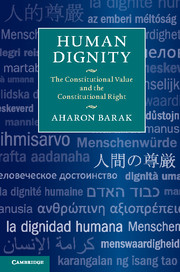Book contents
- Frontmatter
- Contents
- Preface
- Acknowledgements
- Table of Cases
- Part I Fundamental concepts and sources
- 1 The various aspects of human dignity
- 2 The intellectual history of the social value of human dignity
- 3 Human dignity as a value and as a right in international documents
- 4 Human dignity as a value and as a right in constitutions
- Part II Human dignity as a constitutional value
- Part III Human dignity as a constitutional right
- Part IV Human dignity in comparative law
- Bibliography
- Index
- References
1 - The various aspects of human dignity
Published online by Cambridge University Press: 05 February 2015
- Frontmatter
- Contents
- Preface
- Acknowledgements
- Table of Cases
- Part I Fundamental concepts and sources
- 1 The various aspects of human dignity
- 2 The intellectual history of the social value of human dignity
- 3 Human dignity as a value and as a right in international documents
- 4 Human dignity as a value and as a right in constitutions
- Part II Human dignity as a constitutional value
- Part III Human dignity as a constitutional right
- Part IV Human dignity in comparative law
- Bibliography
- Index
- References
Summary
The difference between the intellectual history and the constitutional interpretation
The roots of the English term “dignity” are found in the Latin word dignus, dignitas. In romance languages the words dignité (French), dignità (Italian), dignidade (Portuguese) and dignidad (Spanish) are used. In English dictionaries the definitions of dignity appear as honor, glory and respect.
This abundance of meanings stems from the complexity of the concept of “human dignity.” Over the course of its long history, it has been used primarily as a social value. The appearance of human dignity as a constitutional value and as a constitutional right is new: it is only as old as modern constitutions. Human dignity benefitted from special development in light of the severe violations that took place during the Second World War.
Those dealing with human dignity – whether theologians (like Thomas Aquinas) or philosophers (such as Immanuel Kant) – did not deal with the constitutional value of and right to human dignity as part of a constitutional bill of rights. This is because there was no constitutional bill of rights whatsoever at the time, and there certainly was no discussion of the constitutional meaning – whether as a value or as a right – of human dignity. That discussion has been underway for only a short time, and is still at its very early stages. Of course, the modern discussion of the constitutional value and constitutional right rests upon the long theological and philosophical history of human dignity. However, the constitutional discussion is unique, and is decisively inl uenced by its constitutional character. This is the source of both the importance of the intellectual history to the constitutional discourse, and its limited applicability.
- Type
- Chapter
- Information
- Human DignityThe Constitutional Value and the Constitutional Right, pp. 3 - 14Publisher: Cambridge University PressPrint publication year: 2015

